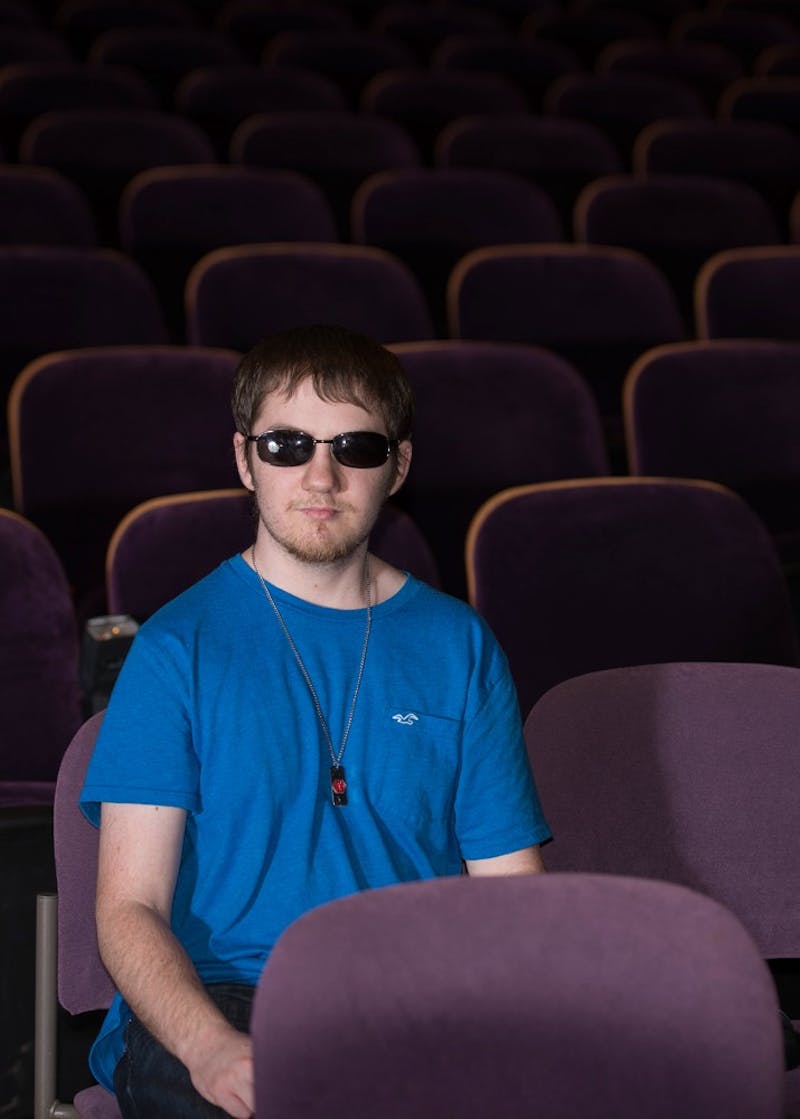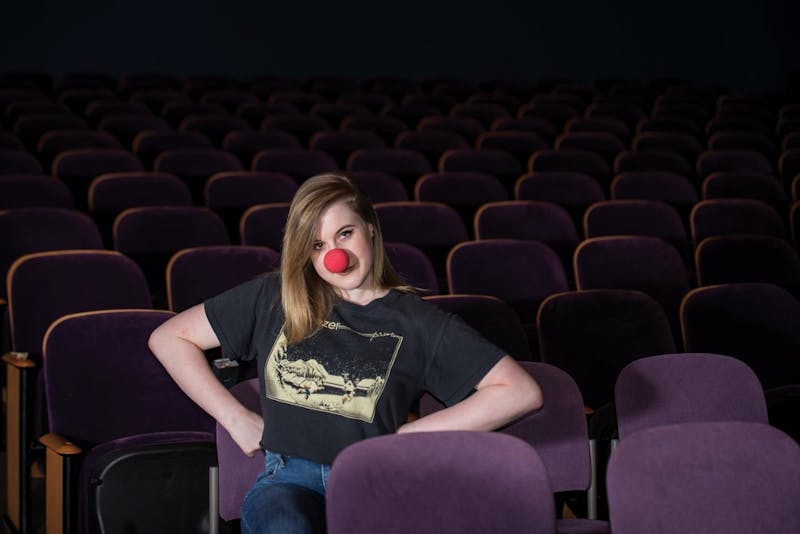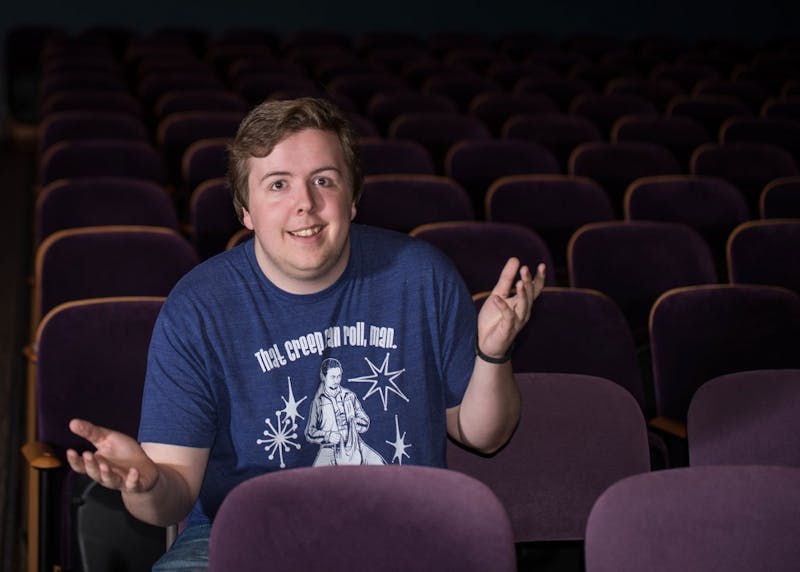Landing Page
Special Projects
This story is part of a series of specially designed stories that represents some of the best journalism The Post has to offer. Check out the rest of the special projects here.

04.05.17
Students and parents fill up chairs as Daniel Brenner, a freshman studying music production, works through his material during Ohio University’s Moms Weekend. It is Saturday night on the first floor of Baker, the night of the week that gives a chance for Blue Pencil Comedy members as well as new faces to try out material on an open-mic, and this particular Saturday is no different.

Lauren Modler
Daniel Bishop, a freshman studying music production, poses for a portrait in Baker Theater on April 5.
Brenner’s subject matter differs, however, from those who precede and follow him on stage.
Brenner is talking about cancer.
“I think I brought it up at one of my first shows,” Brenner said. “I made my joke that I was a cancer survivor, and that’s the reason I’m so short and look like a hobbit.”
Brenner was diagnosed with acute lymphoblastic leukemia when he was 4 years old, and relapsed again when he was 8. Even for years after Brenner had recovered, he avoided bringing those times up to people whenever possible. He didn’t like the way he seemed to be treated differently by those who knew what he’d been through.
“For the longest time I kept to myself about it, mostly because I was always treated kind of with gloves and treated as fragile, even after the whole process was over,” Brenner said. “But being on stage and making jokes about it, it kind of softens the whole thing and makes it easier to deal with. It’s been a great experience, it’s really helped me build my self-confidence.”
Brenner’s story is distinct, but his motivation to perform isn’t unlike what drives many young comedians to the stage.
While many make the initial leap toward stand-up for the purpose of emulating comics they’d watched growing up and sharing their perspective with others, many also find it to be a chance to talk through hardships they might not feel comfortable addressing off stage. That could mean anything from opening up about a trying time from one’s past to using humor to deal with ongoing mental health issues such as anxiety and depression.
From “3 Mics,” a Netflix comedy special from Chappelle’s Show co-creator Neal Brennan which was released in January, to actor and comedian Chris Gethard’s “Career Suicide” one man show set to air on HBO in May, some nationally known comics have begun a trend of using the stage to shed light on darker subjects and turn them into topics that are OK to laugh at.
It doesn’t take a comic with a national tour schedule to use stand-up comedy to deal with personal struggles, though. Comedians on campus at OU can achieve the same benefit, even without attempting to tackle those serious subjects on stage.
“When you’re faced with things that make you sad all the time, you just want to laugh,” Emily Pyle, the vice president of Blue Pencil Comedy, said. “So you look for ways to see things in a funnier way. For me personally, when I’m feeling sad, the thing that makes me happy is to make other people laugh … So it really has helped me cope a lot with my own anxiety issues.”

Lauren Modler
Rachel Bishop, a freshman studying commercial photography, poses for a portrait in Baker Theater on April 5.
The effect that being on stage has on the performer is different from person to person. While some performers such as freshman Rachel Bishop say they don’t notice an impact on the way they think and behave off stage, Brenner said it has helped him make real progress from being the much more shy person he was when he arrived on campus in the fall.
“Off stage I do this thing where I feel like a spaceman, almost,” Bishop, who is studying commercial photography, said. “Like I’m just visiting a situation and there’s all these people in front of me and I’m not a part of it. When I get around this community of people that I’m comfortable with, and it’s something I love doing, and it’s something they love doing, I feel more grounded.”
Some comedians show less hesitation to dig into darker topics on stage, but then face the challenge of attempting to get a laugh while tackling more serious subjects. They can find help in doing so during pitch meetings before shows, when everyone from full-time members to first-timers come together to bounce joke ideas off each other.
During those meetings, comics will tweak jokes in areas such as delivery, word choice and the number of words used to tell it. It’s also a chance for comedians to evaluate what exactly they want their audience to laugh at, and what they’re trying to say with the joke.
“A lot of people are really invested in having the time and space to talk things out,” Peter Vilardi, a former Blue Pencil member who graduated in spring 2016, said. “There was a few times in college when I would go through some crappy situations and I would be like, ‘I can’t wait to tell this to the group because I know I’ll get a killer joke out of it.’ I think it’s really therapeutic.”
That comfort of coming to the group with a bad situation and being able to come away with a different perspective is good example of the community that comedy groups at OU foster with one another.

Lauren Modler
Ryan Harroff, a freshman studying journalism, poses for a portrait in Baker Theater on April 5.
Newcomers to the comedy landscape are welcomed and encouraged from the beginning, and have many chances to break into other comedic endeavors on campus. In addition to Blue Pencil Comedy, OU also has improv groups, and special events such as the women’s show that took place on Moms Weekend, which donated proceeds to the domestic violence agency My Sister’s Place.
“If standup comedy has therapeutic value, I think it’s the result of writing rather than performing,” Mark Schatz, professor emeritus of psychology at OU’s Zanesville campus, said in an email. “Writing, especially writing humor about painful events, provides perspective. By putting life into perspective, humor is a natural pain buffer.”
There’s a saying that goes “comedy is tragedy plus time,” but that’s not to say tragedy is a part of every good comedian’s material, nor is it every comic’s motivation for being on stage. That doesn’t change the fact that every comedian can bring their own stories and challenges to an audience, and come away with a perspective they didn’t have before.
“I think it’s a certain aspect of control,” Chrissy Grieshop, a junior studying political science, said. “When you’re on stage you have five minutes of perfect control that the entire audience has to listen to. In my personal experience, I think telling stories that are really close to me make it a little bit better and easier to think about because then you have those good memories associated with it.”
Landing Page
This story is part of a series of specially designed stories that represents some of the best journalism The Post has to offer. Check out the rest of the special projects here.